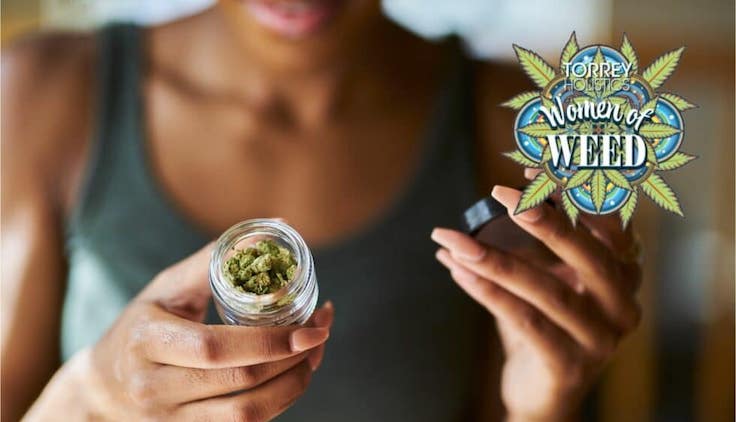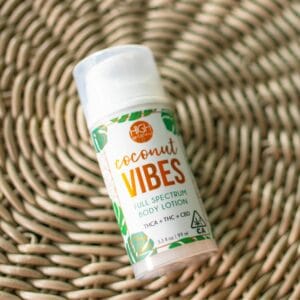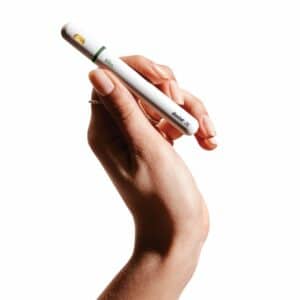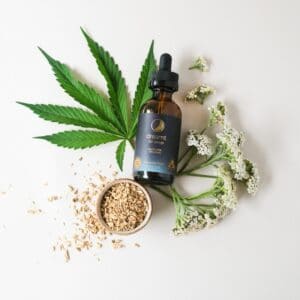By Shelby Huffaker
Torrey Holistics
Perhaps one of the greatest quotes of the modern century came from Martha Stewart, of all people, when in a 2013 interview she admitted, “Of course I know how to roll a joint.” While the revelation of Martha’s cannabis consumption habits came as a shock and amusement to many, references to women’s use of cannabis date back as far as the 7th century BCE, with examples listed in the pharmacopoeias of ancient Mesopotamia, Egypt, Greece, Persia, China, Israel, and India, among many others. Indeed, with ample evidence supporting the use of cannabis in Ancient Egypt, there is no denying that the emblem depicted above the head of Seshat—goddess of wisdom, knowledge, and writing—bears striking resemblance to the psychotropic plant known to many around the world.

Hieroglyph of Egyptian Goddess Seshat
In the decades since 1937, when cannabis became illegal in the United States following a massive, racism-fueled campaign of misinformation (a topic for another article), much of this information disappeared from the public eye. Now, with medical and/or recreational cannabis legal in 35 states, stigmas against the plant are slowly beginning to fade away as ordinary people gain better access to scientific literature and historical data.
Yet, despite these advances, women still tend to be underrepresented among cannabis consumers. Furthermore, this means that a substantial portion of the adult population is missing out on many of the wonderful benefits the plant has to offer, such as relief from chronic pain, inflammation, anxiety, and more. In addition, cannabis may have certain applications of particular interest to women. From arthritis to migraines to menopause, Torrey Holistics elucidates several of the many benefits cannabis can have for women consumers.
Mental Health
The number of people with mental health disorders is of serious concern in our country, and many of these conditions occur more commonly in women than men. According to the U.S. Office on Women’s Health, one in five women in the United States suffers from a mental health disorder such as depression, anxiety, and PTSD.
These psychiatric conditions can have serious impacts on one’s health. In addition to debilitating psychological distress, other common symptoms of mental health disorders in women can include trouble sleeping, migraine headaches, obesity and cardiovascular problems, gastrointestinal upset, and low libido.
Interestingly, research shows that many of these disorders and their symptoms are associated with dysregulation of the endocannabinoid system (ECS). The ECS is a vast and complex network of receptors located in the cells of every system in every vertebrate, including humans. The ECS regulates everything from body temperature to immunity, digestion, metabolism, reproduction, and more.
The constituents that bind to these receptors are known as endocannabinoids. These compounds are made by the body, working like checks and balances to keep the body in a state of homeostasis. Consequently, when a disruption occurs in the levels of these compounds, certain conditions can arise. When clinical endocannabinoid deficiencies (CEDs) exist, it can be tremendously beneficial to consume plant-derived cannabinoids—the therapeutic compounds made by the cannabis plant. This is especially true for individuals with particular mental health disorders.
Much of the research looking at cannabinoids has focused specifically on its impacts on mental health. In particular, numerous studies have established the anxiolytic (anxiety-reducing), antidepressant, and antipsychotic properties of cannabidiol (CBD), a non-intoxicating compound found in the flowers of the cannabis plant. In addition, CBD appears to facilitate fear memory extinction—a major element underlying PTSD—and promote healthy sleep cycles, a factor that is critical to maintaining both mental and physical health. At low-to-moderate doses, THC has also been found to help with anxiety, depression, and sleeplessness, however it is important to note that these effects may disappear at higher doses.
A great option for women suffering from anxiety or depression is a product that contains both CBD and THC. Yummi Karma’s Perfect Pair tincture has equal parts of both to create a soothing, gentle psychoactive effect without producing an intense high, which may cause paranoia in some. For those unfamiliar with the mind-altering effects of THC, start with a quarter of a dropper or less (.25 milliliters) and gradually increase until the desired effects are achieved.
It should be noted that cannabis will not cure mental health disorders; rather, by combining traditional interventions such as therapy, meditation, and the support of one’s social network with a cannabis regimen, it may be easier to keep symptoms under control.
Autoimmune Diseases
For reasons unclear, autoimmune diseases are up to 10 times more likely to occur in women than men. In most people, the immune system launches an attack on foreign agents detected inside the body, such as harmful bacteria. However, in individuals with autoimmune diseases, the immune system attacks its own cells. Oftentimes, the consequence of these erroneous assaults is the onset of debilitating symptoms such as chronic pain and inflammation. Furthermore, the type of autoimmune disease one has depends on which part of the body is under attack. Several of the most common autoimmune diseases affecting women at disproportionate rates include multiple sclerosis, rheumatoid arthritis, and lupus.
Once again, research suggests that individuals with autoimmune diseases tend to exhibit ECS deficiencies. Promisingly, plant-based cannabinoids have well-documented immunomodulatory effects, possibly explaining the anti-inflammatory and pain-relieving properties of the plant. This is of particular interest to those suffering from pain and inflammation caused by the autoimmune diseases listed above. In addition, one meta-analysis found that consuming cannabis was associated with an improvement in levels of spasticity of individuals with multiple sclerosis, a disease that affects the nerve cells of the brain and spinal cord.
For those who struggle with pain and inflammation caused by autoimmune disorders, many find that a two-pronged approach can help to keep their symptoms under control. The first part of the approach involves taking a product high in CBD on a regular basis in order to manage systemic inflammation. For this, a broad-spectrum, easy-to-dose product such as Care By Design’s 18:1 CBD:THC Drops makes for an easy way to establish a daily cannabis regimen. The benefit of taking products high in CBD is that they are typically non-intoxicating at ratios greater than eight to one parts CBD to THC, which some users prefer if they must continue about their day unimpaired.
The other part of this dual approach involves using a product for acute symptom relief. Conditions such as rheumatoid arthritis and multiple sclerosis often present painful symptoms in highly localized regions of the body, which is why some find that a targeted product such as a cannabis topical can ease pain and stiffness in the joints and muscles needing the most relief. A topical such as High Gorgeous’ Coconut Vibes Body Lotion not only smells fantastic but also contains equal parts CBD, THC, and THCA to maximize the anti-inflammatory and analgesic properties of the cannabis plant. Other benefits of topicals is that they are fast-acting, non-intoxicating, and discreet, so they can be used whenever flare-ups occur.
Aside from pain and inflammation, those who struggle with autoimmune diseases also commonly experience comorbidities such as mental health disorders and insomnia. By alleviating pain, anxiety, and depression and by promoting restful sleep, cannabis has the potential to greatly improve the quality of life among those suffering from these diseases.
Headache Disorders
Headache disorders are another category of conditions disproportionately experienced by women that are also associated with clinical endocannabinoids deficiencies. Even before research on CEDs began, medical practitioners as far back as the 2nd millennium BCE have recommended cannabis for headaches; similarly, many prominent physicians have endorsed this view as well, including Sir John Russell Reynold—personal physician to Queen Victoria—and Sir William Osler, founder of modern-day medicine.
Pre-clinical and patient-reported evidence strongly suggests the ability of cannabis to prevent migraines, reduce the intensity of symptoms, and improve quality of life. Cannabis can also blunt pain receptor signaling and address symptoms such as the occurrence of auras, nausea, and anxiety. Historically, migraine sufferers have been advised to take modest, consistent doses as a preventative measure and higher doses for managing acute symptoms.
One great option for curbing the intensity of a migraine is by using a cannabis vape pen. Vaporizers are advantageous for headaches due to their fast-acting effects, which are typically felt fully within one to five minutes. A popular option among beginner vape users is the dosist Dose Pen, which vibrates when the user has inhaled one 2.5 milligram dose. For migraines, studies suggest that products higher in THC tend to alleviate pain more effectively, so formulations with higher ratios of THC to CBD—such as the Bliss 9:1 THC:CBD Dose Pen—may be a good place to start. Novice cannabis users are advised to start with one draw of the pen, titrating up slowly to reach a dose that is most comfortable and effective for alleviating one’s symptoms.
Reproductive Health
In many ways, the fluctuation of hormones experienced throughout a female’s life is natural and healthy. That being said, changes in one’s hormones can undoubtedly be uncomfortable and even unbearable. Indeed, historical records indicate that humans have long used cannabis to minimize the symptoms and side effects of common obstetric and gynecological conditions such as premenstrual syndrome (PMS) and menopause. In addition, current research supports the purported applications of cannabis in managing the symptoms of these conditions.
Individuals who menstruate are most likely well aware of the side effects experienced throughout their cycle. Side effects from PMS and menstruation can include bloating, cramping, mood changes, migraines, nausea. Fortunately, with its pain-relieving, mood-stabilizing, and nausea-reducing properties, many of these symptoms can be alleviated by using cannabis.
In addition to symptoms of PMS, menopause often comes with its own host of side effects. The most common symptoms of menopause include changes in body temperature (“hot flashes”), low libido and pain during intercourse, mood swings, and insomnia. Once again, cannabis can be helpful for managing these symptoms due to its mood-stabilizing and pain-relieving properties. Since cannabis is involved in the regulation of visceral body functions such as thermoregulation, research suggests that THC can lower body temperature—a boon for those who experience hot flashes. Another study found that routine cannabis consumption was similarly associated with improvements in female sexual satisfaction based on all measures, including levels of desire, arousal, lubrication, orgasm, satisfaction, and pain. It is speculated that the reason for these improvements could be due in part to cannabis’ ability to lower anxiety, reduce pain, and heighten the senses.
Some cannabis brands are aware of the issues many women experience during menopause and have created products specifically formulated for sexual intimacy. One such product is Her Highness’ Pleasure Oil, a topical elixir intended to enhance arousal and orgasms in women. Not to be mistaken for a lubricant, this arousing oil can be applied to sensitive areas to increase blood flow and induce relaxation. With CBD, THC, and spilanthes acmella—a South American plant extract known for increasing wetness—the Pleasure Oil is perfect for menopausal women who experience pain and dryness during intercourse.
Aside from normal fluctuations in female hormonal composition, there are certain reproductive disorders that can greatly hinder one’s quality of life. Endometriosis, for instance, is a painful condition in which uterine tissue grows outside of the normal lining of the uterus, spreading to other areas such as the ovaries and fallopian tubes. Other disorders such as pelvic inflammatory disease, painful bladder syndrome, and vulvodynia involve heightened pain receptor signaling in women. In these cases, incorporating cannabis as a way to relieve pain and inflammation may be a valuable tool for keeping symptoms at bay.
A note of caution when it comes to cannabis and reproductive health: research is currently unclear as to cannabis’ effects on fertility, pregnancy, and breastfeeding. Individuals who are pregnant, breastfeeding, or trying to conceive are advised to abstain from cannabis use until more research sheds light on its effects.
Insomnia
Insomnia often goes along hand-in-hand with all of the conditions mentioned previously and is more common among women than men, unsurprisingly. Up to one in four women experience some symptoms of insomnia, including trouble falling asleep, staying asleep, or both. The exact cause of insomnia is unknown but can be influenced by factors such as mental health disorders, chronic pain, and hormonal changes.
In addition to cannabis’ ability to address the underlying factors of sleeplessness, routine use of CBD may also directly regulate circadian rhythms, thereby promoting a more regular sleep schedule. According to both research and a substantial body of anecdotal evidence, THC—the cannabinoid that causes the “high”—can induce sedation, which is of particular interest to those who struggle to fall asleep.
There are numerous cannabis products available at Torrey Holistics that are created specifically for sleep. One customer favorite is dreamt’s Sleep Tincture. Formulated with THC, CBD, melatonin, valerian root, and other calming terpenes, this tincture takes effect within 30 to 45 minutes and lasts up to eight hours, making it perfect for winding down before a full night’s rest.
In Sum
While there is not yet enough research to determine whether cannabis can treat conditions related to women’s health, there is ample evidence to support its ability to manage their symptoms. Furthermore, since every body responds differently to cannabis, it may take a bit of experimentation to find a product that best addresses one’s individual needs. For further guidance, visit Torrey Holistics to talk with one of their knowledgeable cannabis consultants or schedule a private video appointment with their cannabis science specialist Dr. Beth, Ph.D.
These statements have not been evaluated by the FDA. Nothing said, done, typed, printed or reproduced by Torrey Holistics is intended to diagnose, prescribe, treat or take the place of a licensed physician.
About the Author

Shelby Huffaker (she/her/hers) is Torrey Holistics’ Lead Cannabis Educator. As a passionate advocate for cannabis research, social equity, and sustainability within the industry, she is committed to sharing her findings with the general public. Huffaker’s notable achievements include speaking at the San Diego Union Tribune’s Successful Aging Expo and co-organizing the GoodLife Seminar Series, the first cannabis education event held at the Del Mar Fairgrounds.








